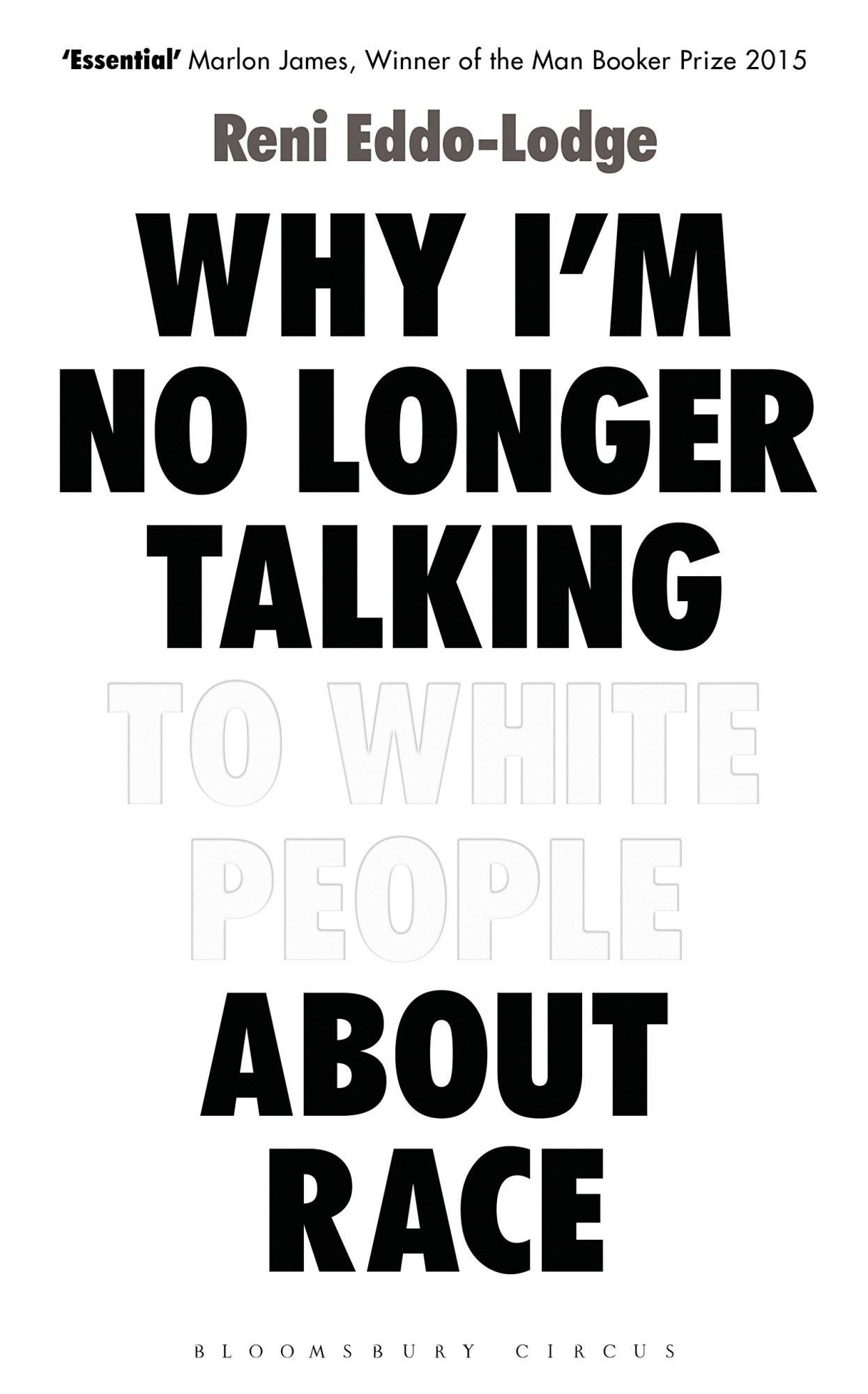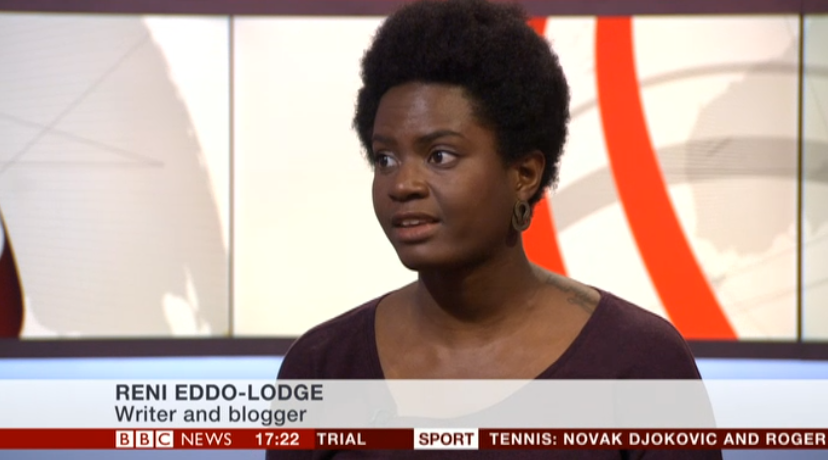Why I’m No Longer Talking to White People About Race initially came into being in the form of a blog post written by Reni Eddo-Lodge in 2014. It emerged from a place of emotional exhaustion and a place of frustration. What follows today is a book of the same name that Reni wants us to use as a tool, as a counter to the lack of historical knowledge and teachings, and, crucially, as a piece of work that lets people of colour know that they aren’t alone. “I just needed to get it out of my head,” Reni says when we meet her to talk about the book. Now it’s out of her head, it’s on the shelves and accompanied by a hugely successful regional tour that sees people of all colours, all races and all genders queuing up to ask questions, to share their own frustrations and to thank Reni for finally giving them a voice.
Here are six things that Reni needs you to understand about race.

1. Black excellence still comes second to white mediocrity…
“While I was freelancing, I was watching white writers who were doing similar things to me being welcomed into publications much faster than I was. I’ve never been welcomed into publications, or given the space as a columnist on a retainer. I’ve watched white writers of similar profiles and similar ages climb the system while I was struggling. Sometimes, friend’s on the periphery of this industry have said to me that they don’t feel that’s an injustice. A lot of young white women get paid to write a lot of rubbish. I realised that my perspective was needed so I’d have to do it without anybody’s permission. I definitely knew that I wasn’t gonna be looking too much for anyone’s approval or going to networking events. And I definitely upset some of my editors. But my book’s out now and theirs doesn’t exist.”
2. You can present the reality of blackness without talking about your love life…
“It was a conscious decision not to make [the book] particularly personal. I’m aware of the dynamics; I’m a young woman, I’m 27, and there’s an expectation that women — in particular — mine parts of their personal lives to sell to the public. I didn’t want to do that. I was encouraged to put more of myself in the book and I avoided that. The book’s not about me, it’s about the issues I raised. I’m a fiercely private person. When I was doing publicity for this book I was asked to write a piece about relationships of my own and I was like, no. If a 27-year-old man is writing a book on his grand theory of the world, is anyone asking him to write about his relationships?”
3. Black identity is more nuanced than is ever shown…
“I resonate with ‘queer’ because I’m not any of the things that people want me to be. I feel like I don’t owe anyone anything. I’m contributing to a canon that already exists and which is so much bigger than me, and I would like the book to be about the ideas rather than me and my personality. Honestly I think I’m a boring person, there’s nothing to see here. Move along, leave me alone, don’t sit next to me on the Tube. I’ve always enjoyed being anonymous, that’s why I struggle to go to rural parts of England where I’m the only black person. I love being in London, you move around and nobody notices you. Fantastic.”
4. Black feminism is as much about power as it is about anything else…
“It’s all about power; the power that feminism is resisting against and how it manifests itself in the movement. So feminists will say, ‘We are against males having a disproportionate amount of the power’ and then everyone in feminism will go, ‘Oh yeah, hmm, we agree with that’. But then, some people who are not white will be like, ‘Yeah I’m also against white people’s share of the power’, and then some white people will go, ‘Hold on, no, no, no, I don’t like that, I don’t wish to give that up’ (laughs). Conceptualising it like that probably puts a lot of the modern day arguments to rest; we all have power and we all lack it in some ways.”
5. Change is happening, but it’s not enough…
“There’s a lot of lip service, but the fact that I’m able to do this book demonstrates progress. The conversations in the book are conversations that we would have with our close friends or around kitchen tables or in living rooms because it was just too risky to have these conversations out in public, in your workplace. What I often say when talking about this, is that there are financial incentives not to speak out; the numbers around wealth and race in this country means that your landlord is more likely to be white, your boss is more likely to be white. To talk about structural racism in an environment where white people take it personally and feel that you’re personally attacking them, means that it’s in your best interests not to speak out. I’m being told by readers who are women of colour, ‘This book is so great, it’s starting a conversation that I have wanted to have in my workplace for five years’.”
6. Reni is not here to be your “magical Negro”…
“One of the big questions that I’ve been receiving over and over again — from mainly white journalists — whilst talking about this book is ‘Well, what can I do?’ I find that question so frustrating, because what I want to say is, ‘I’ve done seven years of thinking, five years of writing, and two years of writing this book full time. When are you gonna do your bit?’ The whole book is about a relationship and if in a relationship somebody says, ‘Oh, something’s gone terribly wrong here, there’s a huge power disparity’, and the person who holds all the power turns around and says ‘Tell me what to do then’ — don’t you think that’s a huge cop-out and a massive way of continuing to defer responsibility? When someone asks me ‘What can I do?’ I’m like, ‘Well, I don’t know your job, I don’t know your friendship group, I don’t know where you hold influence and power in your life, I don’t know how you can think about how to upturn or uproot that institutional racism in your immediate surroundings because I know nothing about you. But you’re looking at me like I’m the Oracle, like I’m the ‘magical Negro’ who is not only going to diagnose your problems but also hold you by the hand, wipe your arse, feed you and solve it’. I’m not doing that. My job as a writer is to identify the problem. I know I’ve done what I can do, which is why I resent people saying ‘Do more for me Reni, please, I can’t do thinking anymore’. What I want white people to do is second-guess themselves. God knows we’ve been doing it for God knows how long.”
Why I’m No Longer Talking To White People About Race is out now on Bloomsbury books.
Credits
Text Candice Carty-Williams
Image via Facebook
